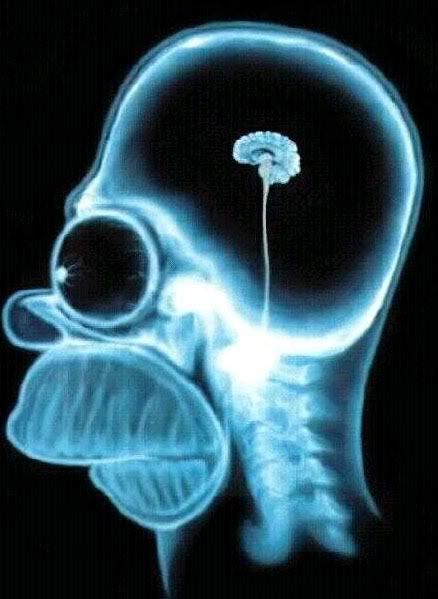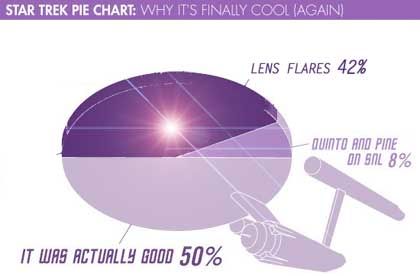
Behold, the target audience of most summer action flicks!
I’ve had this opinion brewing for a while. I touched on it in yesterday’s Netflix post. While the prevailing sentiment out there in the dark and wild expanse of the Internet is that the new Star Trek is, on the whole, good, the film has taken some criticism that the writing was sub-standard, some of the acting was wooden and a lot of the big ideas and brainy philosophy that marked the old series as innovative and locked it forever in the hearts of nerds like myself has been stripped away to be replaced by the kind of kitschy, generic action that appeals to beer-guzzling frat boys. I’m not about to completely poo-poo those arguments, but at the same time I think that while they have some merit, there is enough good in the new Star Trek to balance out the bad.
In case you’ve been hiding in a cave for the last few years, here’s what lead up to this film. Star Trek had, by and large, been languishing in the smell of its own failure for quite some time. The dangerously insidious one-two punch of Star Trek:Enterprise pissing on some of the established history and conventions and Nemesis pitting the Next Generation crew against an ailing Romulan clone of a Frenchman had all but slain the franchise. Enter J.J. Abrams, visionary director and apparently a man with gonads cast in the same metal used for the hull of a starship. Already known for his work in Lost and Cloverfield, Abrams set his sights on one of the most beloved and long-running universes in the history of science fiction. He also had previously done a movie called Mission: Impossible III, which was also a revisit of a franchise that had somewhat tanked and made it cool again, if not quite as good as the original. The best chance for repeat success was to team up with the writers who penned MI3 and also had helped Abrams launch his wildly successful show Fringe: Roberto Orci and Alex Kurtzman.

WANTED for crimes against die-hard fan bases!
Yeah, the same two guys who wrote the two live-action Transformers films. And the unfortunate victims of a LOT of criticism. Some of it is warranted. Revenge of the Fallen was a let-down on a lot of levels. Unlike the renegade smash hit sequels Wrath of Khan and Dark Knight, the second live-action TF flick turned out to be somewhat hackneyed, confusing at times and pandering to the aforementioned frat demographic. Granted, I’m a paradoxical being, in that I’m a Transformers fan and am also willing to admit that the original cartoon series wasn’t exactly the pinnacle of science-fiction writing that will stand the test of time. However, the writing is not the biggest weakness in either film. Sure, it could have been better, and more could have been done with these concepts and characters, but at the helm of the films was Michael Bay. The writers, ultimately, had very little say in how the final product would be put together. When Michael Bay directs, it honestly doesn’t matter how good the writing is. He could pick up Hamlet, fill it with explosions in Denmark, cast Megan Fox as Ophelia, and have 30 Seconds to Mars do the soundtrack. Guess how bad & brainless it would be. Go on, guess.

“I gotta FEVER… and the only PRESCRIPTION… is MORE LENS FLARES.”
Let’s get back to Abrams. He started as a writer and producer and, while his résumé does include the unfortunate missteps of Gone Fishin’ and Armageddon, he’s also responsible for the television series Lost and Fringe. The latter series is, as I mentioned, the result of a collaboration between Abrams and the supposedly criminal writers – and it’s engaging, thoughtful, funny and well-paced. Blaming the failings of Transformers and its sequel on the same writers who brought us Fringe is, in my opinion, illogical. Here’s an example: the last major contribution Uhura made to Star Trek, back in The Undiscovered Country, was reading haltingly out of a Klingon dictionary. It’s one of the few problems with that otherwise solid film, since Uhura is supposed to be an expert in linguistics. In Abrams’ Trek, Uhura is not only a xenolinguist of the highest order, she has the chutzpah to tell Captain Pike that she can do the comm officer job better than the senior officer whom Pike promptly sends to scrub toilets on the engineering deck. On the other hand, back in Transformers, the character of Jazz, who had previously been characterized as Optimus Prime’s competent and improvisational second in command, has fewer than a dozen lines. Instead of focusing on the established characters, the reason we’re sitting in the cinema in the first place, Michael Bay focuses on the bumbling trigger-happy humans and gives us as many opportunities as possible to ogle Megan Fox. By contrast, Abrams’ Star Trek is all about the characters. Scrape the layer of the TF flicks and you’ll just find blasting caps and thongs. Under the lens flares and shiny objects of Star Trek is something a bit more substantial.
I know some critics wanted Star Trek to be ‘about’ more than just zipping around the cosmos blasting things, but consider this: both Kirk and Spock are living in the shadows of their pasts. Kirk is expected to measure up to the heroism of his father, and Spock has a massive chip on his shoulder when it comes to his mother. They need to overcome these challenges in order to seize their destinies. And yes, relying on the machinations of fate to have everything resolve in the space of a story is a mark of lazy storytelling, and might be the weakest part of the film, but the fact that the story is driven by the characters and most of them are portrayed so well balances this weakness. I also know the themes of the film are not as deep or powerful as, say, District 9, but there’s still something meaningful about it, especially for anyone who’s been held to an impossible standard by themselves or others.
And then there are some individuals, one with whom I’d worked personally on something exceptionally nerdy, that believe that this latest iteration has RUINED STAR TREK FOREVER. Between branching universe theory, the support of such luminaries as Leonard Nimoy, the nearly unanimous critical acclaim and the sheer amount of pure awesome packed into this film, I believe I am entitled to my God-given Internet-based opinion that these individuals have a problem in which their cranial spaces have gotten spatially dislocated into their ventral waste disposal cavities. I’d go so far as to continue this little tirade in Klingon, but I don’t want the Internet to explode from such a dense concentration of unapologetic nerd.
…Still don’t believe me? Fine. Ask these guys.



January 3, 2010 at 3:14 am
Uhm… Thanks?!
January 3, 2010 at 11:51 am
@Bob – You’re welcome! I know there’s a lot of very negative criticism out there, and I tried to be a bit more even-handed. I’m still a Transformers fan and still a huge Trek fan, not to mention how much I love Fringe. Keep up the good work, and continue to visit when you can.
January 4, 2010 at 6:23 pm
Appreciate it, truly.